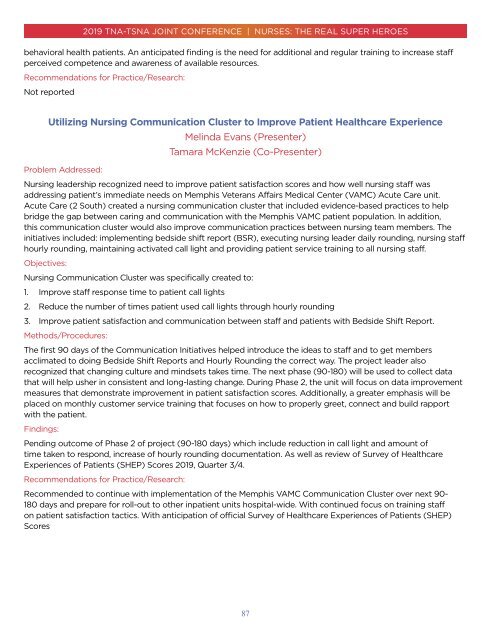2019 Tennessee Nurses Association Book of Reports
Create successful ePaper yourself
Turn your PDF publications into a flip-book with our unique Google optimized e-Paper software.
<strong>2019</strong> TNA-TSNA JOINT CONFERENCE | NURSES: THE REAL SUPER HEROES<br />
behavioral health patients. An anticipated finding is the need for additional and regular training to increase staff<br />
perceived competence and awareness <strong>of</strong> available resources.<br />
Recommendations for Practice/Research:<br />
Not reported<br />
Utilizing Nursing Communication Cluster to Improve Patient Healthcare Experience<br />
Problem Addressed:<br />
Melinda Evans (Presenter)<br />
Tamara McKenzie (Co-Presenter)<br />
Nursing leadership recognized need to improve patient satisfaction scores and how well nursing staff was<br />
addressing patient’s immediate needs on Memphis Veterans Affairs Medical Center (VAMC) Acute Care unit.<br />
Acute Care (2 South) created a nursing communication cluster that included evidence-based practices to help<br />
bridge the gap between caring and communication with the Memphis VAMC patient population. In addition,<br />
this communication cluster would also improve communication practices between nursing team members. The<br />
initiatives included: implementing bedside shift report (BSR), executing nursing leader daily rounding, nursing staff<br />
hourly rounding, maintaining activated call light and providing patient service training to all nursing staff.<br />
Objectives:<br />
Nursing Communication Cluster was specifically created to:<br />
1. Improve staff response time to patient call lights<br />
2. Reduce the number <strong>of</strong> times patient used call lights through hourly rounding<br />
3. Improve patient satisfaction and communication between staff and patients with Bedside Shift Report.<br />
Methods/Procedures:<br />
The first 90 days <strong>of</strong> the Communication Initiatives helped introduce the ideas to staff and to get members<br />
acclimated to doing Bedside Shift <strong>Reports</strong> and Hourly Rounding the correct way. The project leader also<br />
recognized that changing culture and mindsets takes time. The next phase (90-180) will be used to collect data<br />
that will help usher in consistent and long-lasting change. During Phase 2, the unit will focus on data improvement<br />
measures that demonstrate improvement in patient satisfaction scores. Additionally, a greater emphasis will be<br />
placed on monthly customer service training that focuses on how to properly greet, connect and build rapport<br />
with the patient.<br />
Findings:<br />
Pending outcome <strong>of</strong> Phase 2 <strong>of</strong> project (90-180 days) which include reduction in call light and amount <strong>of</strong><br />
time taken to respond, increase <strong>of</strong> hourly rounding documentation. As well as review <strong>of</strong> Survey <strong>of</strong> Healthcare<br />
Experiences <strong>of</strong> Patients (SHEP) Scores <strong>2019</strong>, Quarter 3/4.<br />
Recommendations for Practice/Research:<br />
Recommended to continue with implementation <strong>of</strong> the Memphis VAMC Communication Cluster over next 90-<br />
180 days and prepare for roll-out to other inpatient units hospital-wide. With continued focus on training staff<br />
on patient satisfaction tactics. With anticipation <strong>of</strong> <strong>of</strong>ficial Survey <strong>of</strong> Healthcare Experiences <strong>of</strong> Patients (SHEP)<br />
Scores<br />
87

















